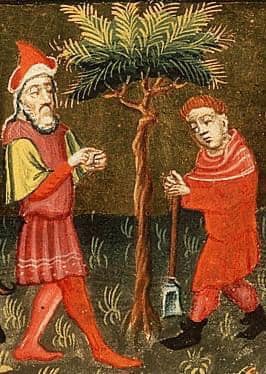 Gospel of 24 October 2020
Gospel of 24 October 2020
Saturday of the Twenty-Ninth Week in Ordinary Time
Luke 13:1-9
'Leave the fig tree one more year'
Some people arrived and told Jesus about the Galileans whose blood Pilate had mingled with that of their sacrifices. At this he said to them, ‘Do you suppose these Galileans who suffered like that were greater sinners than any other Galileans? They were not, I tell you. No; but unless you repent you will all perish as they did. Or those eighteen on whom the tower at Siloam fell and killed them? Do you suppose that they were more guilty than all the other people living in Jerusalem? They were not, I tell you. No; but unless you repent you will all perish as they did.’
He told this parable: ‘A man had a fig tree planted in his vineyard, and he came looking for fruit on it but found none. He said to the man who looked after the vineyard, “Look here, for three years now I have been coming to look for fruit on this fig tree and finding none. Cut it down: why should it be taking up the ground?” “Sir,” the man replied “leave it one more year and give me time to dig round it and manure it: it may bear fruit next year; if not, then you can cut it down.”’
Reflexion
For people who believe that there is a God, it is easy to conclude that every tragedy and disaster has a simple explanation - retribution from God. People who suffer are merely being punished for their sins - they are getting what they deserve. This is divine justice. Well, this reasoning is debunked when we witness the suffering of innocent people, people who don’t deserve to suffer because they have not committed any major crimes.
A group of people who came to seek the Lord’s opinion on a recent tragedy were struggling with this very problem in today’s Gospel. It would be easy to explain that the victims of the massacre by Pontius Pilate and of the collapse of the Tower at Siloam, were being punished for some offence they had committed.
This answer sees a dividing line running through this world separating innocence and guilt. The implicit assumption of course is that, those left alive to shake their heads at these disasters were firmly on the side of the innocent, while these unfortunate victims were on the side of the ‘guilty’ and perished as a result of their sins. In recent times, many too will adopt this reasoning to explain why some have contracted COVID 19, and others have not.
The Lord questions this way of looking at the world and of so easily removing ourselves from guilt due to sin. As scripture says elsewhere “all have sinned and have fallen short of the glory of God” (Rom 3: 23). That is why the Lord invites us to close the door to self-righteousness and open the pathway to repentance and renewal.
Rather than mocking those who suffer and congratulating ourselves for being spared such tragedy, the Lord issues this warning to all: “unless you repent you will all perish as they did.” We should wipe the self-righteous smirks off our faces. The anomaly, our Lord implies, is not that the victims of tragedies were judged, but that so far you have been spared.
He does not literally mean that all who do not repent will meet an untimely death. Rather our Lord identifies these tragedies as signs, warning of a far greater disaster that could overtake anyone of us, our judgment and the loss of eternal life.
Our Lord had taught in the preceding chapter “do not fear those who can kill the body” but rather fear the one “who has the authority to cast into hell” (Luke 12:4-5). Unlike many people today who measure everything in terms of this life, our Lord presupposes the eternal perspective, the resurrection of the dead, and the justice of God. The repentant sinner who died tragically will rise again and receive his reward. The unrepentant sinner, on the other hand, may die peacefully, leaving behind great wealth and a legacy, but he would not escape judgment if he had refused to repent when given the opportunity to do so.
This is the bottom line and the equalising principle - Everyone who has survived to the present will not escape punishment, unless they repent. So when we do witness a tragedy or read about it or had heard an account about it, don’t be too quick to congratulate yourself for being lucky. Nor should you waste your time being an arm-chair philosopher in trying to figure out the reason why it happened. The question we should be asking is not, “Why did this happen?” Rather, the only question we should be asking is this, “now that this has happened, what must I do?” Our Lord gives us the answer: “unless you repent you will all perish as they did.”
